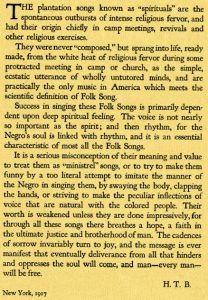In searching through the Sheet Music Consortium, I came across several spirituals arranged by H. T. Burleigh. These publications, such as Oh Peter Go Ring Dem Bells, include a note written by Burleigh about spirituals, in which he describes them as “never ‘composed,’” but “spontaneous outbursts of intense religious fervor.” He touches on other topics we have discussed in class as well, writing that they are “practically the only music in America which meets the scientific definition of Folk Song,” and warning that they should not be treated as “‘minstrel’ songs.”1
Following his statement on folk music, he writes:
“Success in singing these Folk Songs is primarily dependent upon deep spiritual feeling. The voice is not nearly so important as the spirit; and then the rhythm, for the Negro’s soul is linked with rhythm, and it is an essential characteristic of most all the Folk Songs.”1
Here Burleigh seems to be arguing for an authenticity in both the feeling behind a performance and the presentation of the performance as rooted in the history of spirituals as black music.
On the other hand, he elaborates on his warning not to treat spirituals as minstrel songs with the following:
“It is a serous misconception to . . . try to make them funny by a too literal attempt to imitate the manner of the Negro in singing them, by swaying the body, clapping the hands, or striving to make the particular inflections of voice that are natural with the colored people. Their worth is weakened unless they are done impressively . . .”1
Obviously trying to make a serious song comical undermines it, but I was struck by the extent to which Burleigh connects an unworthy and unimpressive presentation directly with how literally black performance practice is imitated. “Swaying the body,” “clapping the hands,” and singing in dialect are all things that St. Olaf’s choirs, for example, do in an effort to present the music with “deep spiritual feeling,” as Burleigh encourages earlier. He also writes, “the voice is not nearly so important as the spirit,” yet he implies that the very things here connected to the spirit take away from the spirituals’ worth. Though he is discussing making a song comical, he strongly suggests that imitation of black performance practice itself is antithetical to an impressive performance.

H. T. Burleigh’s note in Negro Spirituals: Oh Peter Go Ring Dem Bells1
Maybe this is simply because black performance practice at the time could not be separated from minstrel comedy. This could allow for the St. Olaf choirs’ use of elements of black performance practice in a time when it is no longer so directly connected to minstrelsy in audiences’ ears. However, Burleigh was also a major part of the movement to “legitimize” black spirituals by arranging them in a Western classical style. Given this, he could have indeed viewed the “spirit” he talks of as needing to be presented through a white musical context in order to give it legitimacy. On the other hand, if he was writing for a white audience, his message may have been at least partly motivated by his not wanting imitation of black performance practice by non-black performers. Whatever the reasons for the specific performance considerations he discusses, though, this short statement on black spirituals shows some of the many complexities that accompany their performance.
1 Burleigh, H. T. Negro Spirituals: Oh Peter Go Ring Dem Bells. Sheet music. New York: G. Ricordi, 1918. Temple University Libraries, Charles L. Blockson Afro-American Collection. https://digital.library.temple.edu/digital/collection/p15037coll1/id/5379.
“Oh, Peter, Go Ring Dem Bells.” YouTube video, 1:20, posted by Marian Anderson – Topic, Nov 8, 2014, https://www.youtube.com/watch?v=ztVoWTRoyMc.
